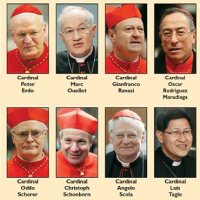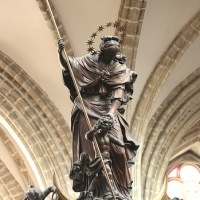Jesus Had Brothers?
5October 15, 2012 by mattfradd
Why do Catholics teach that Mary was a virgin throughout her life when the Bible clearly says that Jesus had brothers? Ever been asked that?
Let me offer four reasons:
1. The Meaning of Brother
The first thing to understand is that the term brother (Gk. adelphoi) has a broader meaning than uterine brothers. It can mean a biological brother, but it can also mean an extended relative, or even a spiritual brother.
Take Genesis 13:8 for example. Here the word brother is being used to describe the relationship between Abraham and Lot who were not biological brothers but uncle and nephew:
“So Abram said to Lot, “Let’s not have any quarreling between you and me, or between your herdsmen and mine, for we are brothers” (Gen 13:8, NIV; see also 14:12).
Because of the Bible’s broad semantic range of “brother,” we can rest assured that though St. Paul writes, “[Jesus] appeared to more than five hundred…brothers at the same time” (1 Cor 15:6), we need not infer from this verse that Mary gave birth to 500+ children.
2. Children of Mary?
These “brothers” are never once called the children of Mary, although Jesus himself is (Jn 2:1; Acts 1:14)
3. Other Women Named Mary
James and Joseph (also called Joses), who are called Jesus’ “brothers” (Mk 6:3) are indeed the children of Mary – Just not Mary, the mother of Jesus.
After St. Matthew’s account of the crucifixion and death of Jesus, he writes:
“There were also many women there, looking on from afar, who had followed Jesus from Galilee, ministering to him; among who were Mary Mag’dalene, and Mary the mother of James and Joseph, and the mother of the sons of Zeb’edee.” (Mt 27:56; see also Mk 15:40).
4. Consensus of the Early Church
The earliest explanation of the “brothers” of the Lord is found in a document known as the Protoevangelium of James, which was written around A.D 150 and speaks of Mary being a consecrated virgin since her youth and of St. Joseph as an elderly widower with children who was chosen to be Mary’s spouse for the purposes of guarding and protecting her while respecting her vow of virginity. Though this document is not on the level of Sacred Scripture, it was written very early, and it may contain accurate historical traditions.
Allow me to limit myself to three quotes from the early Church:
Athanasius of Alexandria
“Therefore let those who deny that the Son is from the Father by nature and proper to his essence deny also that he took true human flesh of Mary Ever-Virgin [Four Discourses Against the Arians 2:70 (c. A.D. 360)].
St. Jerome
“You say that Mary did not continue a virgin: I claim still more that Joseph himself, on account of Mary was a virgin, so that from a virgin wedlock a virgin son was born [Perpetual Virginity of Blessed Mary 21 (A.D. 383)].
Pope St. Leo 1
“The origin is different but the nature alike: not by intercourse with man but by the power of God was it brought about: for a Virgin conceived, a Virgin bore, and a Virgin she remained [Sermons 22:2 (A.D. 450)].
Thus the same Church today affirm:
Jesus is Mary’s only son, but her spiritual motherhood extends to all men whom indeed he came to save: “The Son whom she brought forth is he whom God placed as the first-born among many brethren, that is, the faithful in whose generation and formation she co-operates with a mother’s love (Catechism of the Catholic Church 501).











Since the second century, the Catholic Church has had a clear history of belief that Mary was ever-virgin. Some people, however, would try to refute our belief. They refer to the lines that speak of “the brothers of the Lord” as proof that Mary had other children. This is simply not true. The word in Scripture that is translated as “brother” is adelphos in Greek and aho in Hebrew. In both cases the word literally means “male relative.” While it does not preclude the possibility that Mary had other children, neither does it prove that she did. The best translation of the word would be “kinsman.” For example, in the book of Genesis, Lot is referred to as the aho or “brother” of Abraham, yet we know from the story that Lot was his nephew. There are other strong indications that Jesus did not have any blood brothers. For one, Mark refers to Jesus’ brothers in Chapter 6 as “James and Joses and Judas and Simon.” (Mark 6:3) It would seem to many from this that they were other children of the Blessed Mother. But in his account of Jesus’ passion, Mark mentions that, standing at a distance were “Mary Magdalene, Mary the mother of James and Joses, and Salome.” (Mk 15:40) If James and Joses were other sons of the Blessed Mother, then why wouldn’t Mark call this woman “the mother of Jesus?” Would it make any sense not to do so? The fact that Mark calls this woman “the mother of James and Joses” rather than “the mother of Jesus” is because this woman was not the Blessed Mother but someone else; thus, James and Joses were not his siblings but probably his cousins. Also, John relates the beloved story of Jesus entrusting Mary into the care of St. John at the foot of the cross. (cf John 19:26-27) There was a law at the time of Jesus that, if a woman was widowed, the oldest son was to take care of her; otherwise, she’d be left destitute. If the eldest brother died, the next brother took care of her, and so on. St. Joseph was obviously dead by the time of Jesus’ ministry, and Mary is always somewhere behind the scenes throughout all Jesus’ ministry. Jesus was clearly the firstborn son. If we count all the men referred to as “the brother of the Lord,” there would be about seven of them. As Jesus was dying, the care of Mary would automatically fall to the next son, and then the next, and so on. There would have been about seven men to care for her. So why, then, did Jesus entrust her into St. John’s care? Because there was no one else! With Jesus dead, Mary would have been left destitute, and so even in His passion, He provided for His mother’s care. We also know from ancient traditions that Mary followed along with St. John during his ministry. Are these proof that Mary had no other children? No. But they are strong indication that she did not.
The first time Mary was called ever virgin was in a document called “The Protoevangelion of St. James.” This document, written somewhere between 140-170 AD, while not historically significant as an eyewitness testimony of the life of Christ, is nonetheless a valuable historical testimony to the fact that the perpetual virginity of Mary was a belief held very early on in the Christian community. The document is subtitled, “An Historical Account of the Birth of Christ, and the Perpetual Virgin Mary, His Mother, by James the Lesser, Cousin and Brother of the Lord Jesus, a Chief Apostle and First Bishop of the Christians in Jerusalem.” This is very significant, as it clearly demonstrates that already in the second century AD Mary was considered ever-virgin; furthermore, it clearly calls James a cousin of the Lord Jesus. No one could possibly present a document making these claims as being credible if in fact it was known that Mary had other children. Furthermore, there is no ancient evidence of any belief whatsoever that Jesus had siblings. Every ancient tradition testifies to the credibility of the Catholic belief in the perpetual virginity of the Blessed Virgin Mary.
Why does that matter? Well, for one, could you imagine the problems that would have arisen if Jesus had had siblings? They may have tried to claim a role of prominence simply because of their bloodline. (Remeber Dan Brown’s hoax?) But more importantly, it shows us the nature of the call of God. God doesn’t merely use us; when He calls us, His call is permanent. Virtually all Christians admit that Mary was a virgin when she gave birth to Jesus. If after the birth of Jesus, Mary and Joseph then went on to have other children and raise a regular family, it would seem as if God used her and then dismissed her. It would be as if He had said, “Thank you! I used your virginal womb to accomplish my task, but now it’s done and your services are no longer needed. You may go now!” God doesn’t use us; He calls us permanently! I like to think of it this way: suppose you went to a friend’s house for dinner and they told you they had had eight priests in their family, all of whom have passed away, but they kept their chalices in remembrance of them. Then you go to the dining room table, and there at each place setting is one of the priest’s chalices. The hostess then pours Pepsi into them and says, “Okay now, drink up!” I think you’d be horrified. We’d surely say, “Hey! Those chalices held the Precious Blood of Christ! In soing so, they were forever consecrated and should never be returned to ordinary use!” The same thing with Mary’s womb. By conceiving Jesus, it was consecrated as the very womb of God. To allow it to be used afterwards for others would seem a desecration of something holy. So, while it may not be necessary for the salvific work of Christ for Mary to have retained her virginity, it does tell us of the unique and irrevocable call of God for all of us, as is witnessed by the Perpetual Virginity of the Virgin Mary.
I just read the proto-evangilium of James from the link you put in the text. Joseph says he has sons already. Obviously from the text we see it’s before he meets Mary. Here I’m not challenging Catholic doctrine, I believe what the Church teaches. Is everything in that text is free from error or should we only read it as a historical documents who shows us early christian belief? Thanks for the clarifications!
The belief that Joseph had children from a previous marriage was one of the ways some people tried to explain the brothers of the Lord. You are correct that we don’t believe that everything in these ancient texts is true, but they do show us what some people were thinking. The fact that from the earliest days people were trying to explain the brothers of the Lord as people other than children of Mary indicates that the belief in her perpetual virginity goes back to the very origins of our faith. If, as some people believe, the concept of Mary’s perpetual virginity was something the Catholic Church created centuries later, then why were the earliest Christians already involved in debating it?
Awesome, thank you very much! Makes a lot of sense.
Here’s some comments from Luther, Calvin and Wesley on the topic; they had very Catholic views on the matter! (the quotes are from Mark Shea’s trilogy of books, ‘Mary, Mother of the Son’)
Martin Luther:
“Christ our Savior, was the real and natural fruit of Mary’s virginal womb…This was without the cooperation of a man, and she remained a virgin after that”.
“Christ…was the only Son of Mary, and the Virgin Mary bore no children besides Him…I am inclined to agree with those who declare that ‘brothers’ really means ‘cousins’ here, for the Holy Writ and the Jews always call cousins brothers”.
“Scripture does not say or indicate that she later lost her virginity…When Mathew (1:25) says that Joseph did not know Mary carnally until she had brought forth her son, it does not follow that he knew her subsequently; on the contrary, it means that he never did know her…This babble…is without justification…he has neither noticed nor paid any attention to either Scripture or the common idiom”.
Calvin:
“Helvidius displayed excessive ignorance in concluding that Mary must have had many sons, because Christ’s ‘brothers’ are sometimes mentioned”.
John Wesley:
“I believe…he [Jesus Christ] was born of the blessed Virgin, who, as well after as she brought him forth, continued a pure and unspotted virgin”